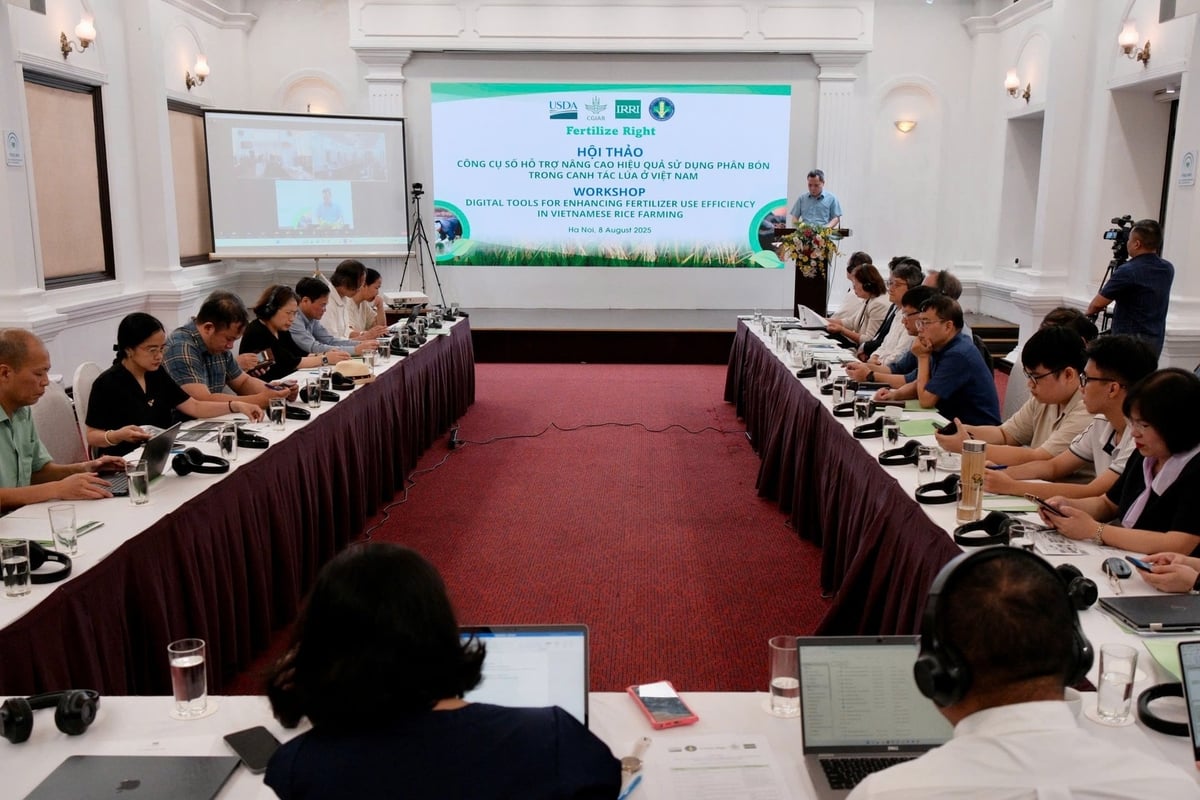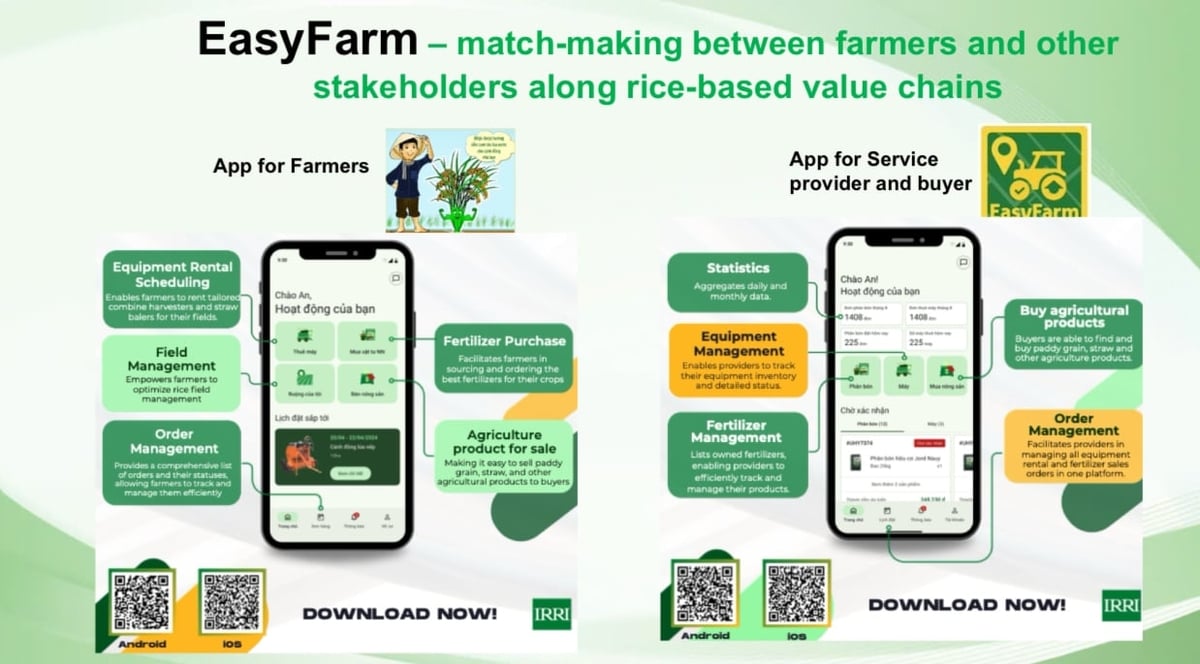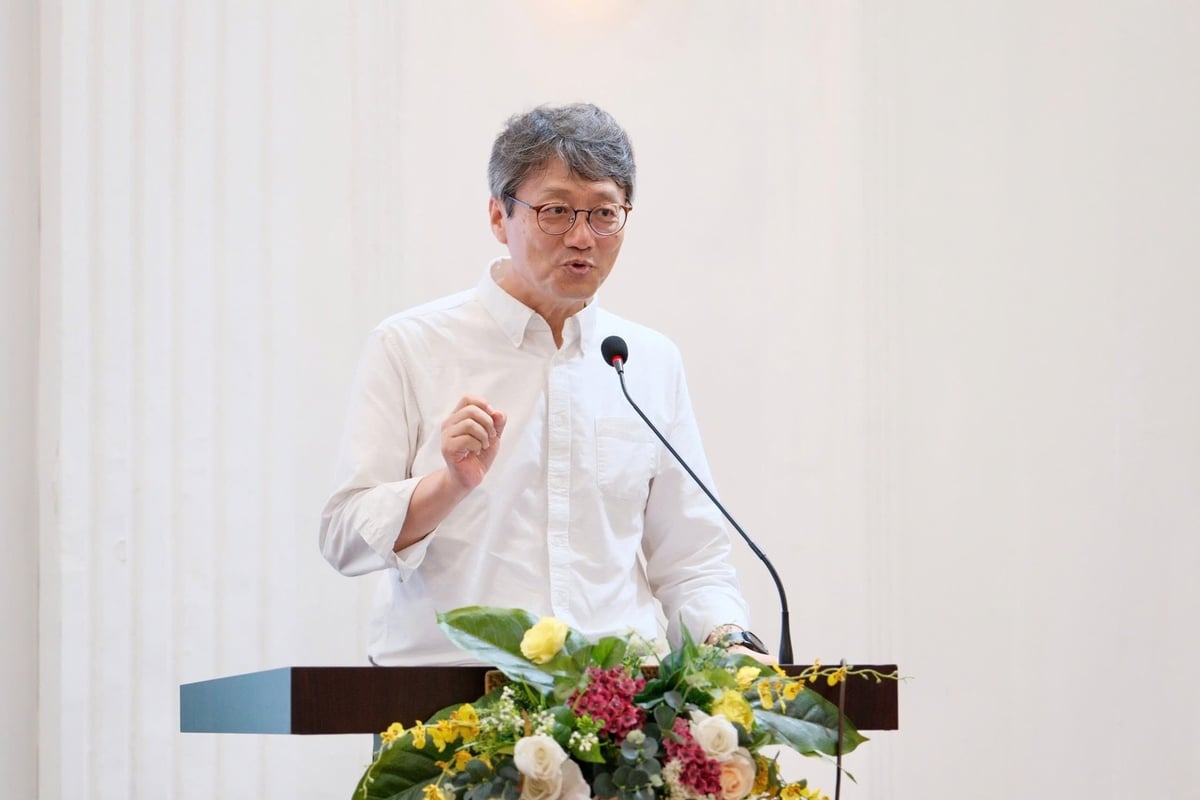December 10, 2025 | 02:14 GMT +7
December 10, 2025 | 02:14 GMT +7
Hotline: 0913.378.918
December 10, 2025 | 02:14 GMT +7
Hotline: 0913.378.918
On August 8, the Department of Plant Production and Protection (Ministry of Agriculture and Environment) and the International Rice Research Institute (IRRI) co-organized the technical workshop “Digital Tools to Enhance Fertilizer Use Efficiency in Rice Cultivation in Vietnam." The event is part of the Fertilize Right Initiative under the USDA-funded Global Fertilizer Challenge, with the participation of 45 domestic and international experts and scientists.
Agriculture is the second-largest greenhouse gas-emitting sector after energy. While the global average fertilizer use is currently 138 kg/ha, in Vietnam, the figure has reached 430 kg/ha (FAO, 2022).
According to Mr. Nghiem Quang Tuan, Deputy Director of the Department of Plant Production and Protection, balanced and efficient fertilizer use is essential not only to reduce input costs but also to minimize environmental pollution, improve soil nutrition, and meet the quality requirements for rice exports.

Department of Plant Production and Protection (MAE) and IRRI co-organized the technical workshop “Digital Tools to Enhance Fertilizer Use Efficiency in Rice Cultivation in Vietnam" as part of the Fertilize Right Initiative. Photo: Quynh Chi.
In addition to selecting high-quality fertilizers, he emphasized that applying digital technology can help farmers quickly access new knowledge, enhance practical skills, and keep up with modern production trends amid pressures on labour and farmland. This challenge cannot be addressed solely through traditional farming experience; it requires the support of science and technology.
Dr. Clemen Gehlahar, representing the USDA Foreign Agricultural Service and Project Manager of the Global Fertilizer Challenge, shared implementation experiences in four participating countries. She noted that compared with Brazil, Colombia, and Pakistan, Vietnam stands out for the close cooperation of its Government and regulatory agencies, enabling more effective and widespread technology adoption.
Under the Vietnam project, four digital tools have been introduced to optimize fertilizer use and promote sustainable soil management:
Soil Nutrition Map, built from over 15,000 soil samples, 2TB of remote sensing data, and machine learning models, this map identifies each area's characteristics, fertility, and nutrient status, enabling farmers and extension workers to adjust the type and amount of fertilizer accordingly. It can be accessed at https://gis.luagao.org.

EasyFarm – a platform connecting farmers with actors across the rice value chain, from input suppliers and service providers to traders and markets. Photo: IRRI.
EasyFarm – a platform connecting farmers with actors across the rice value chain, from input suppliers and service providers to traders and markets. EasyFarm allows service booking, product sales at harvest time, integrated post-harvest management, remote sensing forecasts, and smart agronomic recommendations.
Rice Crop Manager (RCM) – provides site-specific nutrient management (SSNM) recommendations for each paddy field. Trials in the Mekong and Red River Deltas show that phosphorus and potassium use can be reduced without lowering yields, thus improving profits through cost savings. The Vietnam version is currently being piloted in six provinces.
“Lua Viet” Extension App – delivers technical knowledge, instructional videos, and real-time cultivation information, integrating tools such as RCM, the Soil Nutrition Map, EasyFarm, and a virtual assistant drawing on data from IRRI, MAE, and research institutes.
According to Dr. Jongsoo Shin, IRRI’s Asia representative, the Soil Nutrition Map is the “key” to the project. Each plot of land has its own characteristics, requiring tailored recommendations to “reduce some and add some” to improve soil health.

Dr. Jongsoo Shin, IRRI’s Asia representative. Photo: Quynh Chi.
From an implementation perspective, Dr. Nguyen Thi Thanh Thuy, former Director of the Department of Science, Technology and Environment, stressed that profitability is crucial to persuading farmers to change habits. She suggested a two-phase approach: first, identify zones with relatively uniform soil conditions (zone-specific), then move toward site-specific recommendations, a model suitable for large farms.
Assoc. Prof. Dr. Nguyen Van Bo, former Director of the Vietnam Academy of Agricultural Sciences and Chairman of the Scientific Council at Binh Dien Fertilizer, assessed that the project’s initial results are innovative, promising, and aligned with the innovation and digital transformation goals in agriculture set out in Resolution 57-NQ/TW of the Party Central Committee.
He noted that for long-term impact, it is necessary to refine distribution methods for these tools, develop scaling-up plans, address land, financial, and legal barriers, and maintain close cooperation among scientists, farmers, and businesses. In the context of climate change, soil degradation, and food security pressures, balanced and efficient fertilizer use to reduce environmental impacts and enhance rice quality is now imperative.
The Fertilize Right Initiative was designed with the participation of multiple stakeholders: agricultural authorities, research institutes, scientists, fertilizer companies, and farmers themselves. This ensures that technical solutions are adapted to each locality, soil type, and specific cultivation condition.

(VAN) Bach Ma National Park will continue to conserve biodiversity in ASEAN, aligned with sustainable agriculture and environmental development goals.

(VAN) Pu Mat National Park is a green gem of Nghe An province, and its value is further elevated after being officially recognized as an ASEAN Heritage Park.

(VAN) EU expects Viet Nam to seize the chance and comply with green standards to make strong breakthroughs in exporting high-quality agricultural products.

(VAN) These meaningful messages from international partners affirm VAN News' increasingly solid standing.

(VAN) Former Minister Pham Khoi Nguyen expressed his hopes for VAN News as it embarks on a new chapter marking 80th anniversary.
![Hue aims for Net Zero: [5] Building a green and sustainable city](https://t.ex-cdn.com/nongnghiepmoitruong.vn/608w/files/content/2025/12/03/bai-5-anh-6-105459_830-111605.jpg)
(VAN) Hue City continues its efforts to build and maintain a green, sustainable, and environmentally friendly city, joining the Government in pursuing the goal of Net Zero by 2050.

(VAN) After 10 years of operation, Aus4Skills has awarded more than 500 scholarships and enhanced the skills of over 40,000 students, contributing to the strengthening of the strong relationship between the two countries.